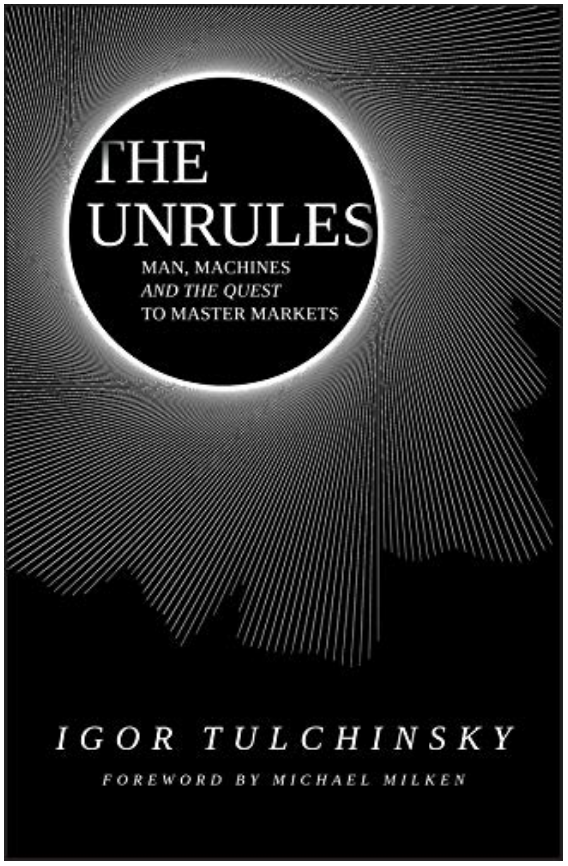[Book] The UnRules - Man, Machines and the Quest to Master Markets
[Book] The UnRules - Man, Machines and the Quest to Master Markets

The UnRules by Igor Tulchinsky is quite an entertaining read: Part memoir, part history of quantitative finance and applied mathematics, part promotion of WorldQuant (Igor’s investment firm), in less than 140 pages. This is the sort of book that could be considered ‘‘motivational’’ and of the ‘‘personal philosophy’’ genre considering the chapter subtitles:
-
“Take aggressive risks, but manage losses.”
-
“All theories and all methods have flaws.”
-
“Events don’t unfold as anticipated, so there are limits to what can be planned.”
-
“Persistence compounds your ability.”
-
“Take action. Nothing else counts.”
-
“Without specific, quantifiable goals, movement through life is Brownian motion – random.”
-
“Knowledge grows from knowledge, and good ideas constitute new knowledge, altering reality in the process of growth.”
-
“Make everyone benefit.”
-
“Think big – it’s easier.”
-
“Quantity is quality.”
Not a big fan of the genre. But this book is more than the usual clickbaits one can find on one’s (facebook) newsfeed about personal development and the paths to the riches.
In between arcane scientific examples (the mathematics of waves) and the description of his seemingly random career choices (playing the odds, like in quant investing), Igor Tulchinsky (CEO of WorldQuant) exposes his vision of quant investing, which I find is partly shared with the one exposed at the start of Lopez de Prado’s book Advances in Financial Machine Learning:
-
Build an alpha factory aiming at extracting a huge number of small and eventually short-lived alphas instead of focusing on a small number of very strong (and crowded) ones; Igor’s “quantity is quality”.
-
Specializing functions:
- Lopez de Prado’s suggest that workers in his alpha factory are becoming the best at their respective tasks (data engineering, feature engineering, model building based on the features (strategists), backtesting (working in total isolation, reporting only to the management, to avoid overfitting using multiple tests);
- Igor splits researchers who create a library of millions of alphas (more or less crowdsourcing the research function), and portfolio strategists who help themselves in this library of signals. To quote the book:
“Today a typical portfolio may contain tens of thousands of alphas; the largest may contain 100,000. To our portfolio strategists, individual alphas, which may have vectors of hundreds or thousands of securities, remain black boxes. The algorithms, logic, and intellectual property remain with the researchers; the strategists know individual alphas only as mathematical expressions of a market signal. As a result, portfolios are not shaped by taking a macroeconomic perspective or exploiting some notion of value. Instead, a portfolio is all math: How does the combination of its alphas perform in the market? What are its characteristics? Can it be improved?
The automation of scientific discoveries is a common theme in Lopez de Prado’s and Igor’s book. WorldQuant seems to have reach this stage for alpha discovery: 13,000 alphas by the end of 2010; 26,000 in 2011; 60,000 in 2012; 425,000 in 2013; 1,700,000 in 2015; 4,000,000 in 2016. An exponential growth.
As a side note, a chapter digresses on the exponential progress of quant biology, and on the cross-fertilizing collaboration between WorldQuant researchers and computational biologists.
This book will sound particulary appealing to quants with a computer science background, maybe less so to economists…
As a takeaway, automate, automate, and automate even more!